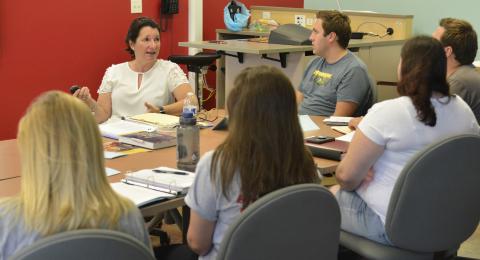Office of Communications and Marketing
- Emergency information
- Nuclear emergency plan
- Emergency resources
- Emergency Information Quick Guide PDF
- New York Alert
- Severe weather procedures
- Social media users' guide
- 5 top tips for social media projects
- Social media communities
- Monitoring and responding
- Content strategy
- Professional conduct
- Campus Update photo galleries
- Records access
- Oswego Today
- Staff
Awards honor Oswego professor dedicated to reading instruction
Office of Communications and Marketing
- Emergency information
- Nuclear emergency plan
- Emergency resources
- Emergency Information Quick Guide PDF
- New York Alert
- Severe weather procedures
- Social media users' guide
- 5 top tips for social media projects
- Social media communities
- Monitoring and responding
- Content strategy
- Professional conduct
- Campus Update photo galleries
- Records access
- Oswego Today
- Staff
Published
Scholarship, teaching and passion led to two recent awards for SUNY Oswego School of Education faculty member Maria Murray -- dedicated to evidence-based practices in the teaching of reading -- and to explosive growth for an organization she founded.
Murray, a member of the curriculum and instruction department and a key faculty member in the college's literacy education master's degree program, recently received the 2017 Perry A. Zirkel ’66 Education Faculty Award for Excellence in Scholarship and Teaching.
Earlier, the Central New York Reading Council honored her with the 2017 Celebrate Literacy Award for exemplary service in the promotion of literacy in the Central New York community.
Service to the community has come atop her work in the college's classrooms. Murray launched The Reading League less than two years ago, watching it reach 2,000 online members from around the world and prepare for its first annual conference in October for up to 300 teachers and other literacy advocates.
"What a perfect recipient she really is," said Associate Dean of Education Kristen Munger, a founding member of The Reading League and the Zirkel award's first honoree, in 2016. "She has a record of rigor in scholarship as well as in the classroom. She's an outstanding teacher."
Zirkel, a graduate of Oswego's School of Education and a leading national authority on education law, established the award to honor excellence in the school and to recognize SUNY Oswego's value as an institution in an enduring way.
"The award is so nice," Murray said. "He (Zirkel) means a lot to me. I've known his work forever."
With many studies showing illiteracy comes with high social and individual costs, Murray has dedicated herself to building educators' knowledge -- both among pre-service teachers and those who are in teaching careers -- in how to teach reading using research-based, proven-effective methods of reading instruction and assessment.
Hunger to improve
In 2015, operating on a shoestring, Murray founded The Reading League to pull together resources for teachers and to conduct events on evidence-based practices. In so doing, she struck a vein.
"We are international now," she said. Attendees for the first of what she hopes to become an annual conference are coming from as far away as Australia and Canada, plus Alaska, California, Wisconsin and many other states.
The growth in membership and attendance at The Reading League's workshops -- all on attendees' own time -- comes from a hunger among teachers who want to keep growing, said Murray, who serves as the unpaid CEO of the organization.
"A big part of our work is to just get people to listen," she said. "We ask administrators, teachers and parents to consider this (evidence-based practices)."
The International Reading Association acknowledges there's no single best way to teach all children or adults to read: "Rather, successful efforts to improve reading achievement emphasize
identification and implementation of evidence-based practices that promote high rates of achievement when used in classrooms by teachers with diverse instructional styles with children who have diverse instructional needs and interests."
Murray's husband has said she "doesn't see roadblocks." A passionate advocate for the teaching of children with developmental disabilities, Murray said she refuses to believe that students of any age cannot be taught to read, whether they have dyslexia, traumatic brain injury, autism or a history of ear infections.
"They can still be taught," she said. "Adults, too. Tens of thousands of people can't read until they get evidence-based help. If adults can learn to read at 50, they could have learned at 6."
'Faces light up'
Jessica Pasik, who earned a master's degree in literacy education at SUNY Oswego in 2016, is a reading teacher at Lanigan School in Fulton. She serves on The Reading League's board and has attended its events.
"I became more and more passionate about reading, largely thanks to Maria and her teaching," Pasik said. "She's very deserving (of the awards). I was always sad when her classes were done."
Using evidence-based practices has the power to change lives, said Pasik. "The numbers and test scores are one thing. But it's amazing to see students grow, and it's so special to see their faces light up when they 'get it,' even for reading a simple sentence."
Murray said The Reading League's practices have been piloted in the Lyncourt School District, and interest from many other districts is heating up. The challenge now, she said, is taking those efforts to scale. To tutor in the schools and to train educators in the practices takes money.
"We have a director now, a staff. We have a reading coach spending days in schools," she said.
The Reading League has received support from the Jim and Juli Boeheim Foundation, Rotary International and Visions Federal Credit Union, and has an application under consideration for a much larger grant from a regional foundation.
Top



